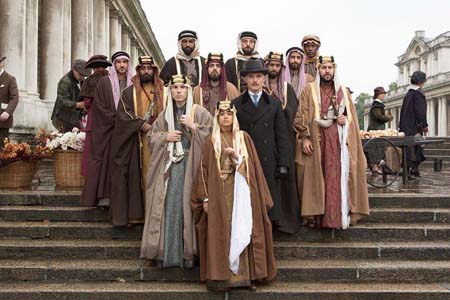The team at the Riyadh-based production house Nebras Films, offers BroadcastPro ME a ringside view of the monumental making of "Born A King" and the potential beyond.

When the 35-year-old ban on cinema halls was lifted in Saudi Arabia, Nebras Films had already co-produced a multi-million-dollar film. The team at the Riyadh-based production house offers BroadcastPro ME a ringside view of the monumental making of Born A King and the potential beyond.
Also read: Q & A with Abdullah Alnafeesah, Chairman of Al Nafees Holding Company and Nebras Films
When an Oscar-winning producer with more than 100 films and TV series under his belt approached Nebras Films to coproduce his magnum opus Born a King in mid-2017, it was a trial by fire for the Riyadh-based construction company that had just set up its full-fledged production facilities. For acclaimed producer Andrés Vicente Gómez, it was the culmination of four years of negotiations with the Saudi government to obtain permits for the first Western film to be partially shot in the Kingdom of Saudi Arabia.

Born A King depicts the early life of Saudi Arabias King Faisal, who was sent to England at the age of 14 on a diplomatic mission. Starring Maleficents Ed Skrein, the 21-day shoot in Saudi Arabia had more than 400 crew from England, Spain and Saudi Arabia, among other countries.
Logistically, the hardest part of Born A King was probably the two days of shooting in Shaqra, followed by another two days in Ushaiger, both about 150km from Riyadh, recalls Niko Ruokosuo, GM of Nebras Films. We moved around 200 members of the crew overnight along with equipment, most of the cast and about ten camels and ten horses to the locations. We set up the camps and operations and filmed from daybreak to sunset for three consecutive days without a break. We had 60 vehicles in the convoy travelling from city to city. It was an impressive sight.
In general, our film operations are built to be mobile with a fleet of cars, vans, trucks and trailers. We could basically take the production to the middle of the desert for three weeks and be fully contained with water, bedrooms (including VVIP), offices, dining, kitchen, makeup, wardrobe and everything else that is needed.
Besides the equipment and vehicles, animals posed a challenge, with some battle scenes demanding more than 100 camels and horses While getting the animals proved more difficult than anticipated, Ruokosuo has fond memories of the falcons on set: I dont think any historical Saudi film would be complete without a few falcon scenes. We worked with some beautiful falcons, including shooting them flying in our green screen studio. This footage was then overlaid with some of the drone footage we shot with our FreeFly ALTA drone and the ARRI ALEXA Mini for a very cool scene in the beginning of the movie.
Ruokosuo declares Nebras spectacular debut in the demanding arena of multi-million-dollar film production a success. Fortunately, his claim has backing. In a press interview, Agustí Villaronga, the Spanish director of Born A King, recalls his early worries about shooting in Saudi Arabia: I said no to the producer twice because I was apprehensive about Saudi Arabia, but now I love going there.
 While an emotional wrap-up party was a touching indication that the crew was well looked after, the high-profile production was a fitting prelude to the announcement in December 2017 of the lifting of the 35-year-old ban on cinema halls in Saudi Arabia. When the news broke, there was a quiet shifting of strategic plans at Nebras. With 42,000sqft of production space newly equipped with ARRI cameras, Master Prime lenses, anamorphic lenses, lighting and grips, vehicles, aerial drones, 3D scanners and surveying, and camera stabilisers and cranes, the opening of the country for international film productions could not have come at a better time for Ruokosuo and his team.
While an emotional wrap-up party was a touching indication that the crew was well looked after, the high-profile production was a fitting prelude to the announcement in December 2017 of the lifting of the 35-year-old ban on cinema halls in Saudi Arabia. When the news broke, there was a quiet shifting of strategic plans at Nebras. With 42,000sqft of production space newly equipped with ARRI cameras, Master Prime lenses, anamorphic lenses, lighting and grips, vehicles, aerial drones, 3D scanners and surveying, and camera stabilisers and cranes, the opening of the country for international film productions could not have come at a better time for Ruokosuo and his team.
He recalls: We had till that point lined up commercial and government-related films and documentaries. Once it was confirmed that cinemas will open and that there will be government subsidies for film productions, we quickly modified our strategy towards making international feature films and high-end documentaries. While we have always prepared for that eventuality given the kind of investments we have made in equipment, we just did not know when the announcement would be made. It came a little sooner than we expected, which was very nice.
Once it was confirmed that cinemas will open and that there will be government subsidies for film productions, we quickly modified our strategy towards making international feature films and high-end documentaries Niko Ruokosuo, GM, Nebras Films
Besides international projects, the stated aim of Nebras Films is, in Ruokosuos words, to tell stories about the Arab region and Saudi Arabia. We feel there are great stories to be told from a region with culture and heritage that is much richer and more varied than is generally known.
The appetite to watch stories on celluloid is evidently there. On April 18, 2017, tickets for the first public screening of any movie since the lifting of the ban, in this case Black Panther at the AMC cinema in Riyadh, sold out in under 15 minutes. The following day, the tickets sold out in under 45 seconds.
Since the announcement of the lifting of the ban, cinema heavyweights from AMC Entertainment to VOX have unveiled plans to open an estimated 3,000 screens in under 10 years. Ahmed Ismail, CEO of VOXs parent company Majid Al Futtaim Ventures, is reported to have said that he will be disappointed if the country does not have at least 100 screens by the end of 2019.
While the broadcast industry is only now beating a path to the Kingdom to explore opportunities arising from $64bn to be spent developing the entertainment sector, Abdullah Alnafeesah, Chairman, Nebras Films, first dreamed of film operations more than 12 years ago. He revived the project and in 2016, serial entrepreneur Ruokosuo was recruited to create a full-fledged production house. The fully operational studio translates to a 42,000sqft production facility that reportedly offers the gamut of services from development and storyboarding to post-production.
The size of the media and entertainment industry in Saudi Arabia is estimated to be $2.4bn and only less than $13.3m of this accrues to Saudi Arabian companies. That is partly why we established the production company Abdullah Alnafeesah, Chairman, Nebras Films
Ruokosuo says: Our main green screen studio is about 600sqm and here we have all the lighting equipment and lenses you can imagine, including anamorphic lenses that are quite difficult to get we were early enough in the market to get it.
He makes special mention of the art studio. Thanks to our background in construction and interior design, we have the people that can build from scratch any prop you might need, from 3D printing to ones processed from Styrofoam or cast in metal. We can produce a whole lot of swords, shields and masks, among other props. Our carpentry workshop is good for props from wood and we also have a complete costumes department.
Ruokosuo also includes the all-important liaising with authorities to get shooting permits in the range of services offered. Giving an overview of the post-production facility being set up in Riyadh, he elaborates: We are installing a full post-production and 3D rendering facility for editing, VFX, colour grading and sound, using Avid, Baselight, Nuke, Maya and Pro Tools as the basis, in our 700sqm brand-new post facility in downtown Riyadh. Our sound studios are Dolby 7-certified, which I think is unique in Saudi Arabia. The installation is ongoing currently and will be operational first week of September.
While Nebras Films and Saudi Arabia are now open for film business, it will be a while before the economy gets a slice of the nearly $30bn spent by Saudi nationals on entertainment and hospitality elsewhere in the Middle East. The number of theatres in Saudi Arabia could rise from one today to between 100 and 150 within five years, according to AMC Entertainment CEO and President Adam Aron, but box office returns are slated to be modest, hovering between $500m and $1bn in the early years.
In addition, stiff entrenched competition confronts production houses such as Nebras Films and the proposed 60,000sqm media city in Riyadh. The MENA already boasts well-established regional film hubs in Abu Dhabi, Dubai and Morocco, among others. And much like the initial apprehensions of the international crew of Born A King, there are a host of misconceptions, from censorship to gender segregation, about Saudi Arabia.
Ruokosuo remains optimistic. And he has his reasons.
He is buoyed by the encouraging reception for the inaugural Saudi Arabia pavilion at the 2018 Cannes Film Festival. Nebras Films was part of the Saudi initiative. The announcement by the Saudi Film Council of a 35% baseline cash rebate programme, which could go up to a 50% rebate on employing Saudi labour, is a critical advantage, he believes.
As for censorship, it is encouraging that only 40 seconds was edited out of Black Panther. Experts believe that the authorities will possibly be conservative at first and liberalise gradually. Censors have reportedly signed off on Warner Bros. Rampage and Disneys Avengers: Infinity War, among other films.
Regarding gender segregation, the world has heard stories of the award-winning Saudi filmmaker Haifaa al-Mansour directing Wadjda out of view by walkie talkie from the back of a van.
Not anymore, it seems.
Ruokosuo says: An estimated 25% of the foreign crew on Born A King was female, and they had a wonderful time here.
Dismissing other perceived challenges, he says: I dont see Abu Dhabi, Dubai or Morocco as competition, I see them as partners in building the industry in the region. Collaboration is the way forward the more we learn from each other, the better our quality of work and consequently more work for all of us.
Talent is surprisingly abundant, he reveals. Thanks to years and years of the government supporting foreign study for Saudi nationals, we have no dearth of talent in the areas of scriptwriting, directing and cinematography. To a degree, there might be shortages in certain specific skills like key grip or drone operator people that we can bring in for specific projects. Besides, we have a new media city coming up and training academies being put in place right here in the country to enhance the talent pool.
Ultimately, the success of the Saudi tryst with opening the media sector and the hope of giving their burgeoning young population 22,000 local jobs by 2030 will depend as much on corporate and government initiatives as it will on old-fashioned word-of-mouth good will.
Critical towards generating that good will is Haifaa al-Mansour, who is returning to Saudi Arabia to shoot her next film. The Perfect Candidate will be the first production supported by the Saudi Film Council, the recently-created body operating under the aegis of the General Culture Authority of Saudi Arabia.
And at Nebras Films, visual word-of-mouth marketing is underway, with the production of a series of high-end documentaries showcasing little-known historical and natural sites around Saudi Arabia. We are showcasing the Nabatean culture in Madain Saleh, the diverse flora and fauna, locations from the deep sea to volcanos Saudi Arabia is much more varied than the average person would imagine.
The Nebras Films team is also building a network of ambassadors that includes filmmaker Matty Beckerman, who divides his time between Hollywood and Riyadh as Nebras Head of Production.
Underscoring the importance of having advocates, Ruokosuo says: Beyond great equipment and skilled employees, we are visiting a lot of studios around the world. We have consulting agreements with experienced filmmakers. We want to build on the goodwill created by the Born A King crew, who came as individual filmmakers and left as family.–
We have great stories to tell
 After a chance visit by Born A King producer Andrés Gómez to a Najd-style palace designed by Nebras Films sister company Diyar Najd Special Projects, he visited Nebras Films new studios, which had just become operational. Reportedly impressed by the equipment, crew and capabilities, he decided that Nebras Films would produce the Saudi Arabian portion of the landmark film. We talk to Abdullah Alnafeesah, Chairman of Al Nafees Holding Company and Nebras Films, about growing the film business in Saudi Arabia.
After a chance visit by Born A King producer Andrés Gómez to a Najd-style palace designed by Nebras Films sister company Diyar Najd Special Projects, he visited Nebras Films new studios, which had just become operational. Reportedly impressed by the equipment, crew and capabilities, he decided that Nebras Films would produce the Saudi Arabian portion of the landmark film. We talk to Abdullah Alnafeesah, Chairman of Al Nafees Holding Company and Nebras Films, about growing the film business in Saudi Arabia.
Why did you revive your film production business in 2014, before the ban on cinemas was lifted?
We were planning to target the regional and Arabic markets, since there are a lot of cinema halls across the Gulf region and the Arab world. Also, we were planning to target the global market by making high-quality movies with local stories. The size of the media and entertainment industry in Saudi Arabia is estimated to be $2.4bn and only less than $13.3m of this accrues to Saudi Arabian companies. That is partly why we established the production company to increase the amount of revenue for local companies. Fortunately, now we have cinemas in Saudi Arabia, which makes it more feasible. Production houses such as yours are hoping to attract international business.
What are the biggest challenges?
The challenges are actually quite few and limited, and our experience with the movie Born a King proves it. We had to manage a large number of crew from different countries. A part of the crew was Saudi and we saw great interaction between them and the international crew. In addition, all of the equipment used in the film was from Nebras Films, a Saudi Arabian company. The crew appreciated our services and the support provided by the government. And now, since the Saudi government has announced that they are going to provide subsidies of 35% of the film budget, and an additional 15% if cast and crew are from Saudi Arabia, the challenges are much less than before. Also, we have many locations that havent been seen in international cinema, apart from great local stories.
How successful do you think you and other storytellers in Saudi Arabia will be, given how conservative the population is?
The fact that we are conservative is actually a plus. We will get support from the people since the content produced by us will be a good local fit with our culture and traditions, unlike content produced by others that might go against our values.
What is your dream?
My dream is the exact vision of Nebras Films, which is to enrich human thought. The richness of the Arab culture provides a great platform to do this.












































































